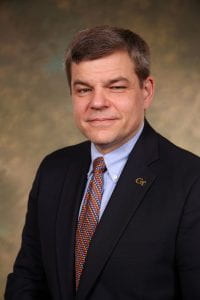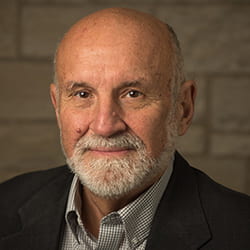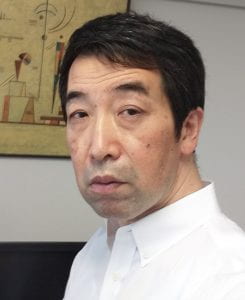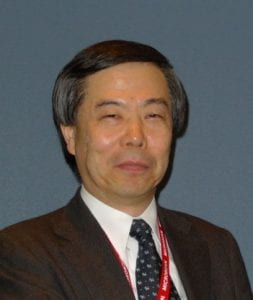Plenary Speakers
Integrating Hybrid Manufacturing Processes via the Digital Thread
Dr. Thomas R. Kurfess
Wednesday, July 8
 In this talk, Dr. Kurfess will discuss integration of real-time sensor data via edge/fog/cloud operations as applied to a state-of-the-art hot wire laser hybrid (additive and subtractive) manufacturing processes. In particular, both design and manufacturing issues will be addressed as they relate to improved control of next generation production systems. The hybrid system is an ideal platform for digital integration as it combines newer metal additive processes with much more classical machining capabilities. The use of large scale data sets from production operations and how they can be leveraged to better understand and automate production processes will be presented. Such opportunities provide an improved platform for classical analytic techniques as well as more modern, data intensive approaches (e.g., AI/ML/DL) to process and operations modeling. The talk will conclude with a discussion of the technology, workforce and infrastructural directions needed to fully leverage hybrid production via the digital thread.
In this talk, Dr. Kurfess will discuss integration of real-time sensor data via edge/fog/cloud operations as applied to a state-of-the-art hot wire laser hybrid (additive and subtractive) manufacturing processes. In particular, both design and manufacturing issues will be addressed as they relate to improved control of next generation production systems. The hybrid system is an ideal platform for digital integration as it combines newer metal additive processes with much more classical machining capabilities. The use of large scale data sets from production operations and how they can be leveraged to better understand and automate production processes will be presented. Such opportunities provide an improved platform for classical analytic techniques as well as more modern, data intensive approaches (e.g., AI/ML/DL) to process and operations modeling. The talk will conclude with a discussion of the technology, workforce and infrastructural directions needed to fully leverage hybrid production via the digital thread.
Thomas R. Kurfess received his S.B., S.M. and Ph.D. degrees in mechanical engineering from M.I.T. in 1986, 1987 and 1989, respectively. He also received an S.M. degree from M.I.T. in electrical engineering and computer science in 1988. He currently serves as the Chief Manufacturing Officer at Oak Ridge National Laboratory. At present, he is on leave from Georgia Tech where he is the HUSCO/Ramirez Distinguished Chair in Fluid Power and Motion Control and Professor of Mechanical Engineering. During 2012-2013 he was on leave serving as the Assistant Director for Advanced Manufacturing at the Office of Science and Technology Policy in the Executive Office of the President of the United States of America. In this position he had responsibility for engaging the Federal sector and the greater scientific community to identify possible areas for policy actions related to manufacturing. He was responsible for coordinating Federal advanced manufacturing R&D, addressing issues related to technology commercialization, identifying gaps in current Federal R&D in advanced manufacturing, and developing strategies to address these gaps. He was President of the Society of Manufacturing Engineers in 2018, and currently serves on the Board of Governors of the ASME. His research focuses on the design and development of advanced manufacturing systems targeting digital manufacturing, additive and subtractive processes, and large-scale production enterprises. Kurfess He is a member of the National Academy of Engineering and is a Fellow of ASME, SME, and AAAS.
Hybrid Multi-scale Manufacturing Processes and Systems
Professor Kornel Ehmann
Thursday, July 9
 Current scientific understanding and available technologies are still limited in their ability to generate engineering solutions and meet manufacturing demands imposed by ever increasing requirements on manufacturing and functional efficiencies as they relate to accuracy, productivity, production control, waste reduction, and customization, to mention a few. To this end, developments that address some existing process- and system-related limitations will be presented. First, several newly conceived processes and enhanced versions of conventional processes principally in the areas of cutting-, laser-, deformation- and additive-based methods, spanning the micro- to the macro-scales, will be introduced. Examples will include methods for the generation of micro-features and engineered surfaces in terms of their topographical and physical properties to meet precisely prescribed functional characteristics at the micro-scale along with rapid prototyping methods for functional parts at the macro-scale. Second, the impetus provided by advances in IT technologies that are gradually finding inroads into all realms of advanced manufacturing enterprises ranging from the basic monitoring and control of the hardware functions of the production machinery through process control to the management of the supply chains will be discussed. To this end, current efforts toward the development of an operating system for cyber-physical systems and the creation of a generic process control platform for distributed systems will be presented. The examples presented will principally highlight activities under the auspices of the Northwestern Initiative for Manufacturing Science and Innovation (NIMSI) and the Advanced Manufacturing Processes Laboratory (AMPL).
Current scientific understanding and available technologies are still limited in their ability to generate engineering solutions and meet manufacturing demands imposed by ever increasing requirements on manufacturing and functional efficiencies as they relate to accuracy, productivity, production control, waste reduction, and customization, to mention a few. To this end, developments that address some existing process- and system-related limitations will be presented. First, several newly conceived processes and enhanced versions of conventional processes principally in the areas of cutting-, laser-, deformation- and additive-based methods, spanning the micro- to the macro-scales, will be introduced. Examples will include methods for the generation of micro-features and engineered surfaces in terms of their topographical and physical properties to meet precisely prescribed functional characteristics at the micro-scale along with rapid prototyping methods for functional parts at the macro-scale. Second, the impetus provided by advances in IT technologies that are gradually finding inroads into all realms of advanced manufacturing enterprises ranging from the basic monitoring and control of the hardware functions of the production machinery through process control to the management of the supply chains will be discussed. To this end, current efforts toward the development of an operating system for cyber-physical systems and the creation of a generic process control platform for distributed systems will be presented. The examples presented will principally highlight activities under the auspices of the Northwestern Initiative for Manufacturing Science and Innovation (NIMSI) and the Advanced Manufacturing Processes Laboratory (AMPL).
Ehmann is a Professor of Mechanical Engineering at Northwestern University. He is the past Chair of the Manufacturing Engineering Division of ASME and is the past President of NAMRI/SME. He is a Fellow of ASME and SME, and recipient of the SME Education Award, the SME Gold Medal and the ASME Milton Shaw Research Medal. General Dynamics, General Electric, General Motors, Ford, Chrysler, IBM, Ingersoll, SpeedFam, American Tool, LLNL, and others have supported his work. His main research interests are in the interrelated areas of machine tool structural dynamics, metal cutting dynamics, computer control of machine tools and robots, accuracy control in machining, metal cutting processes, and micromanufacturing.
Research on Production Systems: does it still fascinate ambitious students?
Professor Masahiko Onosato,
Hokkaido University, Japan
 Now we are at the greatest turning point in the long history of manufacturing. People in production systems have directly faced the physical entities such as products and machines and made tight interactions by observing and operating them. Recently, the growing cyberspace has come to intervene between people and physical entities and divide the interaction loop into two individual loops. The field of production systems requires many young people with challenging minds to develop the future manufacturing concept in the new schema based on cyberspace. However, production systems engineering seems to have so far failed to attract them. In the speech, three naïve but fundamental questions about production systems are presented. The questions are Q1:“Does ideal production need no system?” Q2: “Does production in the future still need humans?”, and Q3: “What makes researchers in production engineering feel disadvantaged?” These questions are explained and partially answered with reference to some research activities of the speaker’s group at Hokkaido University.
Now we are at the greatest turning point in the long history of manufacturing. People in production systems have directly faced the physical entities such as products and machines and made tight interactions by observing and operating them. Recently, the growing cyberspace has come to intervene between people and physical entities and divide the interaction loop into two individual loops. The field of production systems requires many young people with challenging minds to develop the future manufacturing concept in the new schema based on cyberspace. However, production systems engineering seems to have so far failed to attract them. In the speech, three naïve but fundamental questions about production systems are presented. The questions are Q1:“Does ideal production need no system?” Q2: “Does production in the future still need humans?”, and Q3: “What makes researchers in production engineering feel disadvantaged?” These questions are explained and partially answered with reference to some research activities of the speaker’s group at Hokkaido University.
BIOGRAPHY
Masahiko Onosato is a professor in the Faculty of Information Science and Technology at Hokkaido University, Japan. He received a bachelor’s degree and master’s degree in precision machinery engineering from the University of Tokyo in 1983 and 1985 respectively. Since 1985, he worked as research associate of The University of Tokyo, Kobe University, and Osaka University and received Ph.D. from the University of Tokyo in 1993 for his research on computer-aided conceptual design. in early 1990, he started a research project on Virtual Manufacturing System (VMS) at Osaka University and the published papers have been referenced to in many publications as the first proposal of VMS concept. From 2003, he is directing the laboratory of digital systems and environments at Hokkaido University. His research interests include design and planning of production systems, cyber field modeling, and GAREKI (collapsed building) engineering. He is a board member of ISCIE and a fellow of JSPE.
Dr. Shinsuke Sakakibara
Fanuc Corporation
The current manufacturing industry has many challenges, including:
・Large loss due to unexpected shutdown of factories
・Balance of productivity improvement and environmental friendliness
・Major fluctuations in product kind and production volume
・Lack of skilled personnel
Fanuc Corporation is working hard to solve the above problems by realizing a next-generation smart factory with robots and IoT technology.
BIOGRAPHY
1972: Graduated from the department of applied physics at the University of Tokyo
Entered Fanuc Corporation
1999: Honorary General Manager, Robot Laboratory, Robot Business Division, Fanuc Corporation
2009-2010: President, Robotics Society of Japan
2012-2013: President, International Federation of Robotics (IFR)
2013: Executive Officer, Fanuc Corporation
2018: Chief Technical Advisor, Robot Business Division, Fanuc Corporation
